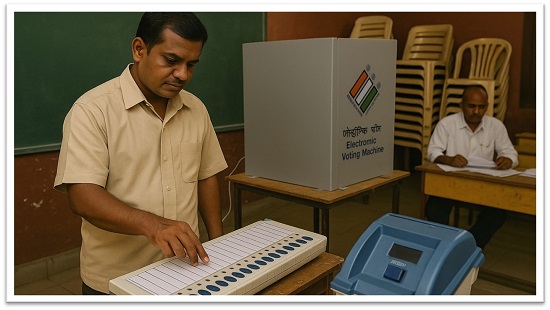
Maharashtra Set for Massive Civic Poll Push as SEC Seeks ₹200 Crore for 1 Lakh New EVMs
In a move signaling the return of electoral action across Maharashtra, the State Election Commission (SEC) has requested ₹200 crore to procure one lakh new electronic voting machines (EVMs) ahead of civic and local body polls, slated for completion by the end of January 2026. This large-scale logistical operation marks the most extensive local-level electoral exercise in the state in recent years, covering municipal corporations, zilla parishads, panchayat samitis, and nagar panchayats.
The SEC has written to both the Urban Development Department (UDD) and Rural Development Department (RDD), seeking equal financial participation, ₹100 crore each, to fund the procurement of EVMs. Given that over one lakh polling booths will be set up across urban and rural Maharashtra, the requirement underscores both the scale of administrative preparedness and the financial coordination needed between departments.
Civic Elections on the Horizon
According to official communications, the SEC will conduct elections for 32 zilla parishads, 336 panchayat samitis, 29 municipal corporations, 248 municipal councils, and 42 nagar panchayats. The exercise, expected to conclude by January-end as per the Supreme Court’s directive, will be crucial for local governance continuity across Maharashtra’s urban and rural spectrum.
For the Urban Development Department, the focus remains on managing municipal corporations and councils, while the Rural Development Department oversees zilla parishads and village-level institutions. Together, these bodies form the backbone of Maharashtra’s decentralized governance system, one that directly influences the state’s infrastructure, water management, education, and healthcare delivery mechanisms.
Funding the Electoral Machinery
The SEC’s demand for ₹200 crore comes at a time when administrative and logistical costs have risen significantly due to expanded voter rolls, upgraded technology, and higher election management standards. Each EVM is expected to be deployed, tested, and maintained across polling stations spanning diverse terrains, from dense metros like Mumbai and Pune to remote talukas in Vidarbha and Marathwada.
To facilitate the process, the Urban Development Department has already directed the Directorate of Municipal Administration (DMA) to release ₹50 crore earmarked as subsidiary grants for municipal bodies to undertake preparatory works and ensure civic readiness ahead of the elections.
Earlier, the department allocated another ₹50 crore to the SEC from funds generated through cess on property registrations and stamp duty. A portion of these collections is typically reserved for urban infrastructure and large-scale public projects such as Metro rail development, reflecting the financial interlinkages between infrastructure investment and civic administration.
Rural Development Department’s Role
On the rural front, the RDD has released ₹10 crore to the district collectors across 32 districts to cover administrative costs associated with zilla parishad and panchayat samiti elections. These allocations support ground-level election management, from staff deployment and training to logistics, security, and voter education campaigns.
Given the size and complexity of rural Maharashtra, ensuring electoral integrity and efficiency demands not only technological tools like EVMs but also substantial human and financial resources. The RDD’s allocation underscores the importance of localized planning and district-level coordination in executing state-wide elections smoothly.
Technology and Transparency
The decision to procure one lakh new EVMs is more than a logistical move; it’s an investment in electoral credibility. Maharashtra’s SEC aims to ensure every voter experiences a seamless, transparent, and tamper-proof voting process. With over one crore voters expected to participate in the upcoming polls, reliable technology forms the backbone of electoral trust.
The EVM procurement will also modernize older voting units that have been in use for over a decade. These machines, designed to handle higher voter volumes and enhanced security protocols, are expected to reduce technical errors and speed up vote counting, strengthening the state’s democratic infrastructure.
Supreme Court’s Deadline and Administrative Pressure
The timeline for completing the civic and local body elections has been clearly defined by the Supreme Court, which mandated that all pending local polls across Maharashtra be conducted by January 2026. The directive came after a series of delays caused by administrative reshuffling, constituency delimitation, and reservation-related litigations.
The SEC’s race against time involves multiple moving parts, financial approvals, procurement processes, staff training, and coordination with state and local authorities. “The synchronization between the UDD and RDD is vital,” said a senior official familiar with the process. “Urban and rural elections cannot be seen in isolation. Both define governance at the most immediate level for citizens.”
The Broader Implication: Governance at Grassroots
Beyond the mechanics of elections lies a larger narrative, the renewal of grassroots democracy in Maharashtra. Local body elections are where policy meets people. They determine how city budgets are allocated, how roads are repaired, how water systems are maintained, and how welfare programs are implemented.
For the state government, the smooth conduct of these elections is both a political and administrative litmus test. Transparent polls could help restore public confidence in local governance structures that have, in recent years, struggled under caretaker arrangements and bureaucratic overlap.
Moreover, civic elections often set the tone for broader political currents in Maharashtra, influencing alliances, voter sentiment, and leadership dynamics ahead of future assembly and parliamentary polls.
Charting the Future of Decentralized Governance
As Maharashtra readies itself for this extensive democratic exercise, the focus extends beyond voting day logistics. The SEC’s call for modernization, through the procurement of advanced EVMs and improved administrative mechanisms, reflects an evolving understanding of governance that is data-driven, transparent, and people-centric.
If implemented effectively, the upcoming elections could strengthen the institutional foundation of urban and rural governance in the state. From financial prudence to administrative efficiency, this moment represents a renewal of democratic accountability at its most immediate and meaningful level, the citizen’s doorstep.
As January approaches, the gears of Maharashtra’s electoral machinery turn once again. The stakes are not just political; they are institutional. In the months ahead, the SEC’s preparedness and the state’s coordination will determine not only who wins at the ballot box but how democracy functions where it matters most, on the ground.





